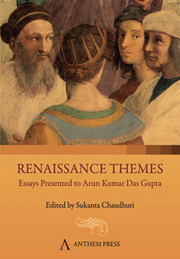Book contents
- Frontmatter
- Contents
- Preface
- List of Contributors
- Arun Kumar Das Gupta
- The Renaissance God as Man of Letters
- Ramist and Senecan Elements in Joseph Hall's The Art of Divine Meditation
- Hypocrite Lecteur: Reading on the Early Modern Stage
- Vertigo
- Folly and Androgyny: Shakespeare's King Lear
- ‘Fatal Visions’ in Macbeth
- The Miltonic Dissimile: Language and Style in Paradise Lost, Book 4
- ‘A Moving Grave’: Positioning Samson Agonistes
- Plate section
Vertigo
Published online by Cambridge University Press: 05 March 2012
- Frontmatter
- Contents
- Preface
- List of Contributors
- Arun Kumar Das Gupta
- The Renaissance God as Man of Letters
- Ramist and Senecan Elements in Joseph Hall's The Art of Divine Meditation
- Hypocrite Lecteur: Reading on the Early Modern Stage
- Vertigo
- Folly and Androgyny: Shakespeare's King Lear
- ‘Fatal Visions’ in Macbeth
- The Miltonic Dissimile: Language and Style in Paradise Lost, Book 4
- ‘A Moving Grave’: Positioning Samson Agonistes
- Plate section
Summary
Everyone remembers that dizzying passage in King Lear when Edgar recounts to his father the effects of leaning over a non-existent cliff. What we recall is the stupendous clarity of the visualization, heralded by that line which ‘haunted’ Keats, ‘Hark, do you hear the sea?’ Edgar speaks of the fear of falling but, as commentators since Johnson have noticed, ‘diffuses his attention to distinct objects’:
Half-way down Hangs one that gathers samphire, dreadful trade!
Methinks he seems no bigger than his head.
The fishermen that walk upon the beach
Appear like mice, and yon tall anchoring barque
Diminished to her cock; her cock, a buoy
Almost too small for sight. The murmuring surge
That on th'unnumbered idle pebble chafes,
Cannot be heard so high. I'll look no more,
Lest my brain turn and the deficient sight
Topple down headlong.
John Bayley picks up Johnson's comment, ‘the crows impede your fall’, and argues that what the imagination is doing here is not plummeting to a depth but soaring into a different universe in its exhilarating observation of particulars, so characteristic of the liberating force of Shakespeare's poetry: crows, choughs, samphire-gatherer, the mice-like fishers and ‘diminished’ bark are points marking a free flight rather than free fall. Should the lines have been ‘all precipice, – all vacuum’ as Johnson believed? His own critical deprecation was full of zestful substantives:
The enumeration of the choughs and crows, the samphire-man and the fishers, counteracts the great effect of the prospect, as it peoples the desert of intermediate vacuity, and stops the mind in its descent through emptiness and horrour.
- Type
- Chapter
- Information
- Renaissance ThemesEssays Presented to Arun Kumar Das Gupta, pp. 62 - 79Publisher: Anthem PressPrint publication year: 2009
- 1
- Cited by

